1) “Che was genocidal and would ruthlessly kill those who opposed him, as well as innocent cilivians, women and children. He also ran camps where he personally executed people himself.”
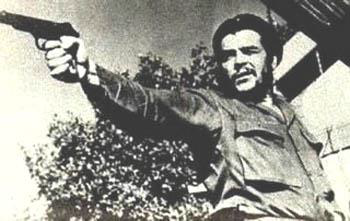
Che firing a Soviet Stechkin automatic pistol.
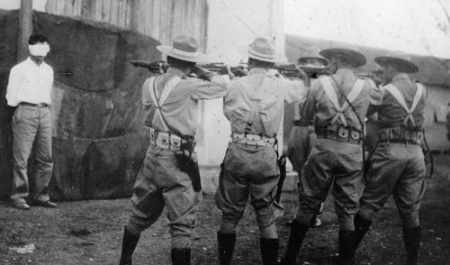
An anti-Batista rebel about to be executed by Batista’s army.
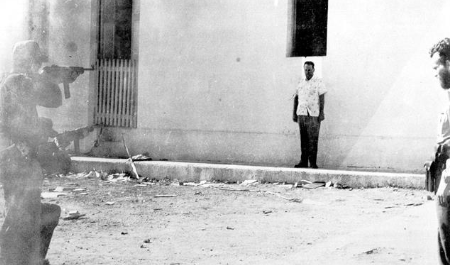
Captain Alejandro García Olayón being executed by a rebel firing squad led by René Rodríguez Cruz. García Olayón was noted for his murder of countless Cuban rebels, and was hand-picked by Batista, added to his personal staff of assassins, to eliminate the rebel threat.
Che did indeed kill people. He killed enemy soldiers on the battlefield, like any professional soldier of any nation. He killed undisciplined guerillas who would abuse their power and terrorize the populace, raping and killing peasant women and children. Che also killed soldiers of Batista’s army for heinous war crimes, and members of the hated secret police, the Bureau of Repression of Communist Activities, who were known for their brutality and use of torture. People seem to forget that in times of war, both sides commit heinous acts as the nature of war is violent and brutal, and signs of weakness usually mean defeat. This is true to the nature of the Unitedstatian Civil War, the Russian Civil War, The First and Second World Wars, The Vietnam War, etcetera. Usually, what happens is that, in the case of the Russian Civil War and the Cuban Revolution, the reactionary faction in power is brutal and uses atrocious methods to eliminate the rebel threat like torture. The rebels are then forced to become just as bad if they want to secure victory. Violence breeds violence. Batista’s pro-US puppet regime was paradise for mafia kingpins and Unitedstatian businessmen, and hell for Cubans and those in extreme poverty. Revolutions like these, demanding immediate and specific changes, don’t happen without a reason.
The best part regarding the media manipulation of this affair is that Fidel and the revolutionaries would often ask the populace (peasants and workers) whether they wanted those sentenced to death to be pardoned, and the peoples unanimously always requested their executions. Batista’s supporters were noted for their war crimes and use of physical torture aside from other atrocities, so it’s no surprise the peasants wanted the revolutionaries to exact justice they couldn’t bring for themselves. Of course, this is never mentioned in the media. It is now a well-known fact that the Cuban revolutionaries had mass support from the locals, and that it is one of the factors why the managed to win. Peace Walker even acknowledges this fact in one of its briefing tapes. Here’s what Jon Lee Anderson has to say;
“I have yet to find a single credible source pointing to a case where Che executed ‘an innocent’. Those persons executed by Guevara or on his orders were condemned for the usual crimes punishable by death at times of war or in its aftermath: desertion, treason or crimes such as rape, torture or murder. I should add that my research spanned five years, and included anti-Castro Cubans among the Cuban-American exile community in Miami and elsewhere.”
So you see, even his detractors are honest enough to point out to the ruthless vilification of Che for the simple purpose of damaging his image (according to Anderson, at least; I’ve never heard of Cuban-Unitedstatians in Miami defending him). Sadly, that Che was a vicious and sadistic murder is the profile people in reactionary societies get to know. I personally find it funny how a country known for its heavy usage of the death sentence can criticize the Cuban revolutionaries who executed people for war crimes as murderers, but that’s hypocrisy for you.
2) “Che was a homophobe, same as Fidel, known for their hatred of homosexuals. Homosexuals were imprisoned and killed for their sexual orientation and they were discriminated in their daily lives, rendered outcasts in society.”

Mariela Castro, attending an LGBT rally in Cuba.
In 20 years, we have seen so much progress regarding acceptance of homosexuality in society that we fail to notice how homosexuality used to be a major issue not simply to Communists, but to all people, in all countries, regardless of political ideology. Latin American society, just like Spanish society, was and is highly masculine and men are proud of their masculinity, and effeminate men are often seen negatively because they appear to reject their masculinity. It’s a cultural thing.
Russians are vilified in the media today for the same reason. While it’s wrong to discriminate and persecute others for their sexual orientation, 80% of people in Russia and a majority of people in Eastern Europe simply view homosexuality negatively, and they do not consider it something they can appreciate , look up to or that it’s related to them or their culture in any way. Thus, most Russians dislike homosexuality. There have been many advances in gay acceptance in Latin America and Eastern Europe, but let us remember that the US also had and has severe issues not only with homosexuality but with racism. These are global issues that transcend national boundaries and cultures. Thrusting these issues on the Cuban Communists it’s just expected of Che’s enemies.
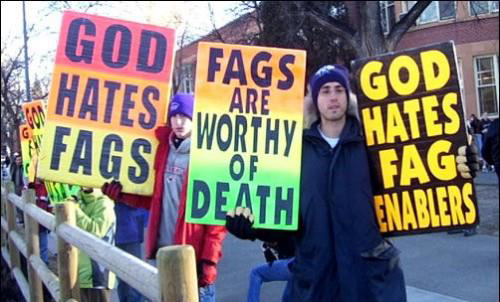
Homophobic religious protestors in the US.
In Cuba homosexuality was once considered abnormal and a disease to be treated by the government, but now in Cuba Mariela Castro herself, a sexologist, is the head of the Cuban National Center for Sex Education and spreads worldwide pro-gay views and educates people on the acceptance of gays. Fidel himself has recognized his mistakes as part of a narrow-minded mentality of old. As I told a gay friend recently, the main issue with homosexuality in society is education and awareness, or better said, the lack of it. I used to share homophobe views myself precisely for this reason, and I have since changed them just as the times have changed to give gays a place in society, and this is the reason why today I have homosexual friends. Some homophobic friends of mine gradually and naturally changed their views as well when they got to meet homosexual people.
Homosexuality is accepted today because of popular awareness and has even been adopted by progressive parties and even Communists (who used to view gays as abnormal) purely because left-wing movements fight for the oppressed, for equality and for the rights of all, and unlike reactionary right-wing currents, they always adapt to the times. Cuba’s LGBT activism nowadays, spearheaded by the daughter of the president of Cuba herself, clearly reflects the changes in society through the times. Of course, nobody ever mentions the blatant anti-gay views held by many people in the United States, especially in the Midwest regions, where racism sadly also is alive and well.
Che in Congo next to an Afro-Cuban soldier and holding a Congelese baby, 1965.
Members of the Ku Kux Klan, in the United States. The Ku Kux Klan (and the open and systematic racism tolerated in the US) was constantly denounced by Che.
3) “Che was a racist, who hated blacks and pejoratively called them ‘niggers’ amongst other slurs and considered them inferior.”
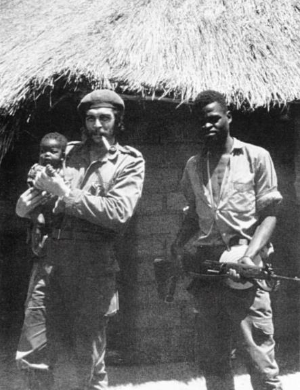
Che in Congo next to an Afro-Cuban soldier and holding a Congelese baby, 1965.
This is one of the most demagogical ones, and it mostly stems from Che’s entry diaries in Congo, where he attacks the Congolese in frustration not because of their race, but because they were lazy, rude, superstitious, uncooperative, showed no commitment to fight, had bad discipline and sometimes even refused to fight at all, throwing their weapons and fleeing; a nightmare for an internationalist guerilla who went to the country selflessly to fight for their cause. This is from Jon Lee Anderson’s biography;
“At a couple of the fronts, the men seemed well armed and disposed to fight, but everywhere there was passivity and general chaos. The jefes often drank to the point of stupefaction, passing out in full view of their troops. The rebels raced back and forth in jeeps, but did little to further the war effort. They occupied fixed positions and didn’t train, go out on patrol, or gather intelligence. They forced the intimidated and mistreated local peasants to supply them with food. ‘The basic characteristic of the Popular Liberation Army,’ Che concluded, ‘was that of a parasitic army.’ “
“Che found the Congolese lazy. During marches, they carried nothing except their personal weapons, cartridges, and blankets, and if asked to help carry an extra load, whether food or some other item, they would refuse, saying, ‘Mimi hapana Motocar’ (‘I am not a truck’). As time wore on, they began saying, “Mimi hapana Cuban” (‘I am not a Cuban’).”
“The attack, which begun on July 29, was a catastrophe. The assault leader, Víctor Dreke, reported that at the first outbreak of combat, many of the Tutsi fled, abandoning their weapons, while many of the Congolese simply refused to fight at all. Over a third of the men had deserted before the fighting even began.”

Members of the Ku Kux Klan, in the United States. The Ku Kux Klan (and the open and systematic racism tolerated in the US) was constantly denounced by Che.
It’s very easy to pick a few lines of frustrated anger from Che’s diary and instantly label him as a racist. He was human after all, and had all the right in the world to get frustrated, especially in such a situation. Anyone in his shoes would have become disillusioned with the Congolese. The fact of the matter is, he went to Congo where he could have been easily killed merely to help in the internationalist struggle for socialism. This supposed racism can be easily refuted with his actions in Congo, here’s a small example; Che was assigned a teenage interpreter in Swahili named Freddy Ilanga. Over the course of seven months Ilanga grew to admire him for his hard-working nature and because he showed the same respect to black people as he did to whites.
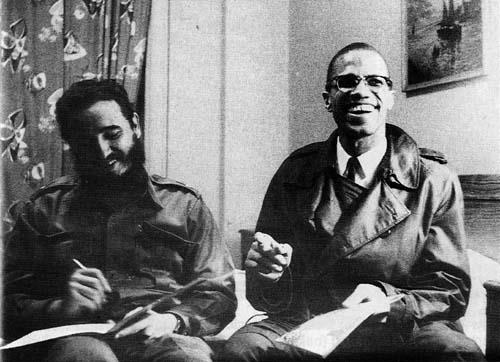
Fidel Castro and Malcolm X. There aren’t photos of Che and Malcolm X, as they met only once and in private. Malcolm X openly admired Cuba, and Che for his anti-racist views and even read poems by Che in meetings. When Che visited the US in 1964, Malcolm X called him “one of the most revolutionary men in this country right now.”
Che also spoke often in United Nations summits, and criticized the United Nations’ inability to confront the “brutal policy of apartheid” in South Africa, asking “can the United Nations do nothing to stop this?” Che attacked the United States claim of being a “democracy” stating that such a system was not compatible with “financial oligarchy, discrimination against blacks, and outrages by the Ku Klux Klan.” He denounced the United States policy towards their black population, stating:
“Those who kill their own children and discriminate daily against them because of the color of their skin; those who let the murderers of blacks remain free, protecting them, and furthermore punishing the black population because they demand their legitimate rights as free men—how can those who do this consider themselves guardians of freedom?”
Malcolm X, famous activist for the rights of blacks in the US and assassinated for his views, met Che once during the revolutionary’s New York visit in December 1964. Che traveled to New York City as head of the Cuban delegation to speak at the United Nations. Malcolm X expressed his admiration, by declaring Che “one of the most revolutionary men in this country right now,” while reading a statement from Che (where he expressed his solidarity with the black movement) to a crowd at the Audubon Ballroom.
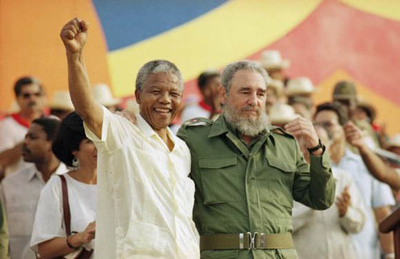 And, lastly, let us not forget about Nelson Mandela, the man who ended racism in South Africa after the brutal era of apartheid, recognized worldwide as one of the greatest figures of peace. A good friend of Fidel, Mandela referred to Che as “an inspiration for every human being who loves freedom.”
And, lastly, let us not forget about Nelson Mandela, the man who ended racism in South Africa after the brutal era of apartheid, recognized worldwide as one of the greatest figures of peace. A good friend of Fidel, Mandela referred to Che as “an inspiration for every human being who loves freedom.”

